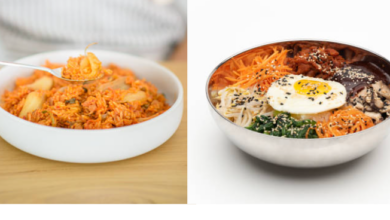Unveiling The Nutritional Power Of Bibimbap: Can You Eat It Everyday?
What To Know
- While bibimbap is a nutritious dish, there are certain considerations to keep in mind if you plan on eating it every day.
- While it’s a nutritious dish, its high calorie density and potential for high sodium content make it less suitable as a daily meal.
- Bibimbap is a delicious and nutritious Korean dish that can be enjoyed in moderation as part of a balanced diet.
Bibimbap, a beloved Korean dish, is a vibrant bowl of rice, vegetables, meat, and a fried egg. While its tantalizing flavors and nutritional value make it a tempting daily meal, it’s essential to consider the potential implications of consuming it excessively. In this comprehensive guide, we’ll delve into the nutritional aspects of bibimbap and explore whether it’s feasible to enjoy it as an everyday staple.
Nutritional Profile of Bibimbap
Bibimbap is generally considered a healthy dish, providing a good balance of macronutrients and micronutrients. Here’s a breakdown of its nutritional components:
- Calories: A typical serving of bibimbap contains around 500-600 calories, depending on the ingredients used.
- Carbohydrates: Rice is the primary carbohydrate source, providing energy and fiber.
- Protein: Bibimbap typically includes meat (e.g., beef, chicken, or pork), which contributes to protein intake essential for muscle growth and repair.
- Fat: Bibimbap contains a moderate amount of fat, primarily from the meat and sesame oil used in the sauce.
- Vitamins and Minerals: Bibimbap is a good source of vitamins and minerals, including vitamin A, vitamin C, iron, and calcium.
Benefits of Eating Bibimbap
Consuming bibimbap regularly offers several potential health benefits:
- Improved Blood Sugar Control: The combination of fiber from the rice and vegetables helps regulate blood sugar levels, making bibimbap a suitable meal for individuals with diabetes or prediabetes.
- Reduced Risk of Heart Disease: The unsaturated fats in bibimbap can help lower cholesterol levels and reduce the risk of heart disease.
- Enhanced Digestion: The fiber in bibimbap promotes healthy digestion by supporting regular bowel movements.
- Boosted Immune System: The vitamins and minerals in bibimbap, such as vitamin C and iron, contribute to a stronger immune system.
Considerations for Daily Consumption
While bibimbap is a nutritious dish, there are certain considerations to keep in mind if you plan on eating it every day:
- Sodium Content: Bibimbap can be high in sodium, especially if it’s prepared with added sauces or condiments. Excessive sodium intake can contribute to high blood pressure and other health concerns.
- Calorie Density: Bibimbap is a relatively calorie-dense dish. Consuming it daily without considering portion sizes can lead to weight gain.
- Variety: Eating the same food every day can limit your nutrient intake. It’s important to incorporate variety into your diet to ensure you’re getting a wide range of nutrients.
How to Make Bibimbap Healthier
If you’re considering making bibimbap a regular part of your diet, here are some tips to enhance its nutritional value:
- Choose Lean Protein: Opt for lean protein sources such as chicken breast, tofu, or fish instead of fatty meats like beef or pork.
- Limit Sodium: Avoid adding excessive amounts of sauces or condiments that can increase sodium content.
- Increase Vegetables: Load your bibimbap bowl with a variety of vegetables to boost fiber and nutrient intake.
- Use Brown Rice: Swap out white rice for brown rice to add fiber and nutrients.
- Add Healthy Fats: Incorporate healthy fats from sources like avocado or nuts to enhance flavor and satiety.
Is Bibimbap Suitable for Daily Consumption?
Based on the nutritional information and considerations discussed above, it’s generally not recommended to eat bibimbap every day. While it’s a nutritious dish, its high calorie density and potential for high sodium content make it less suitable as a daily meal.
Alternative Healthy Korean Dishes
If you’re looking for healthy Korean dishes to enjoy regularly, consider these alternatives:
- Gimbap (Korean Sushi): A nutritious roll filled with rice, vegetables, and meat or fish.
- Tteokbokki (Spicy Rice Cakes): A flavorful dish made with chewy rice cakes, vegetables, and a spicy sauce.
- Bulgogi (Marinated Beef): A delicious and protein-rich dish made with thinly sliced marinated beef.
- Samgyeopsal (Grilled Pork Belly): A savory dish of grilled pork belly served with various accompaniments.
Final Note: Enjoy Bibimbap in Moderation
Bibimbap is a delicious and nutritious Korean dish that can be enjoyed in moderation as part of a balanced diet. However, it’s not recommended to consume it every day due to its calorie density and potential for high sodium content. By making healthier choices when preparing bibimbap and incorporating variety into your diet, you can enjoy this Korean delicacy without compromising your overall health.
Frequently Asked Questions
1. Is bibimbap a good source of protein?
Yes, bibimbap typically includes meat (e.g., beef, chicken, or pork), which is a good source of protein.
2. How can I make bibimbap healthier?
You can make bibimbap healthier by choosing lean protein, limiting sodium, increasing vegetables, using brown rice, and adding healthy fats.
3. What are some healthy Korean dishes that I can enjoy regularly?
Gimbap (Korean sushi), tteokbokki (spicy rice cakes), bulgogi (marinated beef), and samgyeopsal (grilled pork belly) are all healthy Korean dishes that can be enjoyed regularly.
